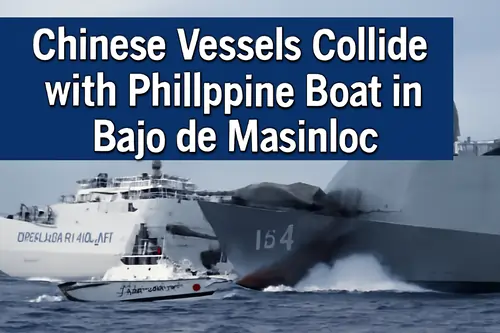Manila, Philippines – August 2025
In the latest maritime incident in the West Philippine Sea, two Chinese vessels collide while chasing a Philippine patrol boat near Bajo de Masinloc. This confrontation, which took place on Monday, involved the Philippine Coast Guard (PCG) escorting boats distributing aid to Filipino fishermen.
The incident has once again highlighted the growing tensions in the South China Sea, a region claimed almost entirely by China, despite international rulings declaring such claims as illegitimate.

The Collision Event
The collision occurred when the Chinese Coast Guard (CCG) tried to block a Philippine Coast Guard vessel by speeding up to intercept it. According to PCG spokesperson Commodore Jay Tarriela, the Philippine vessel was positioned between two Chinese Coast Guard ships and a Philippine Navy warship.
The Chinese vessel, attempting a sharp turn to catch up with the Philippine patrol boat, miscalculated its move, leading to a collision.
A loud crash was heard as the Chinese Coast Guard ship and a larger vessel marked with the number 164 collided.
This was a clear demonstration of how the China Coast Guard’s reckless pursuit of Philippine vessels can lead to dangerous consequences. The collision resulted in substantial damage to the CCG vessel’s forecastle, making it unseaworthy.
Damage and Aftermath
Following the crash, Tarriela confirmed that the Philippine Coast Guard vessel remained unharmed, and no injuries were reported from either side. However, the Chinese Coast Guard did not respond to offers of assistance from the PCG, a concerning development in an already tense situation.
Despite this, the Philippine personnel continued their mission, showcasing the commitment of the Philippine Coast Guard to their duty of safeguarding the Philippine waters and protecting Filipino fishermen operating in the disputed areas.
Escalation of Tensions
This incident is just the latest in a series of escalating confrontations between China and the Philippines in the South China Sea. The disputed region is of strategic importance, with over 60% of global maritime trade passing through its waters.
Despite an international court ruling rejecting China’s territorial claims, Beijing continues to assert control over nearly all of the South China Sea, causing heightened tensions with the Philippines and other neighboring countries.
The collision between Chinese vessels and the Philippine Coast Guard is indicative of China’s increasing aggression towards Philippine vessels, especially in the West Philippine Sea, a part of the South China Sea claimed by the Philippines.
This ongoing territorial dispute raises critical concerns about freedom of navigation, regional stability, and international law.
Additional Confrontations During the Operation
During the same operation, another Chinese vessel targeted the BRP Suluan, a Philippine Coast Guard ship, with a water cannon. However, the BRP Suluan successfully evaded the attack, underscoring the tense and volatile nature of China-Philippines maritime confrontations.
Despite the harassment and aggression from the Chinese Coast Guard, the Philippine Coast Guard continued to escort Filipino fishermen to safety, ensuring their secure relocation to a safe area.
The fishermen were also provided with necessary fuel and supplies, demonstrating the Philippine government’s unwavering support for its people in the face of increasing maritime threats.
Political Reactions
In the wake of the Chinese vessels colliding, political leaders from both the Philippines and international organizations have spoken out.
- President Ferdinand Marcos Jr. reaffirmed the Philippine commitment to patrol its waters and exercise its sovereign rights over the West Philippine Sea.
- Senate President Pro Tempore Jinggoy Estrada condemned the dangerous actions of the Chinese Coast Guard and urged China to cease aggressive maneuvers that endanger both maritime personnel and the lives of Filipino fisherfolk.
- Deputy Minority Leader Risa Hontiveros expressed concern over China’s reckless behavior, emphasizing that these actions are not only dangerous to Filipino personnel, but they also endanger Chinese personnel.
- Senate Majority Leader Joel Villanueva expressed gratitude towards the Philippine Coast Guard personnel for their resilience in asserting Philippine jurisdiction over the West Philippine Sea, urging the Chinese to respect international law and Philippine sovereignty.
National and International Impact
The collision between Chinese vessels and the Philippine Coast Guard is not just a local issue but one with global significance. The South China Sea is an international waterway, and tensions in the region impact global maritime trade.
The ongoing China-Philippines confrontations are a reminder of the importance of maintaining a rules-based international order.
As the Philippines continues to assert its rights over the West Philippine Sea, it faces not only military threats but also the economic implications of navigating the disputed waters. The international community must step up to ensure that such confrontations do not escalate into open conflict but are instead handled through diplomatic means and adherence to international law.
Conclusion
This latest incident between Chinese vessels and the Philippine Coast Guard serves as a stark reminder of the delicate balance in the South China Sea. The Philippines’ assertion of its rights over the West Philippine Sea remains strong despite the Chinese Coast Guard’s aggressive actions.
The country’s patrol vessels will continue to be present in the area to protect the nation’s territorial integrity and safeguard its fishermen.
The Philippine government’s call for peaceful resolutions and respect for international law is essential in maintaining regional peace and stability. The situation also emphasizes the need for countries involved in the dispute to engage in dialogue and cooperation to avoid further escalation and ensure the freedom of navigation and peaceful coexistence in the region.
Reference:
- 2 Chinese vessels collide while chasing Philippine boat in Bajo de Masinloc: PCG
- Chinese ships collide off Scarborough Shoal; PH Coast Guard offers aid

Maria Theresa Mondragon, better known online as Antie Marites, is a 33-year-old Filipina content creator who’s turning “chismis” into credible news and meaningful conversation.
With a knack for storytelling and a passion for public service updates, Antie Marites creates relatable, informative, and bite-sized news content for the digital Pinoy. Whether it’s trending headlines, government announcements, or everyday life in the Philippines, she breaks it down in a way that’s clear, fun, and easy to understand—no filter, no fake news.
She’s the tita who sips her kape while scrolling DBM updates and turns it into your next viral TikTok.She’s also your go-to source for “real talk sa real-time news.”
Follow her journey and daily chika on:
📲 Facebook: OMGMarites
📱 TikTok: @omgmarites2025
